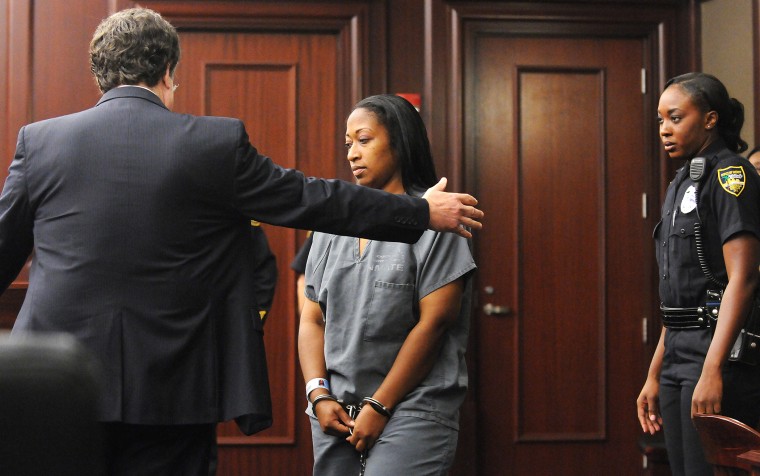Marissa Alexander may face 60 years in prison for firing what she says was a "warning shot" at her abusive estranged husband, as the Florida State Attorney's office prepares to retry her on three counts of aggravated assault.
Alexander had been serving a 20-year sentence for aggravated assault when a judge ordered she receive a new trial, finding that the jury instructions in her original trial were erroneous. Many of her supporters cheered the announcement, believing that the mandatory minimum 20-year sentence was overly harsh for Alexander, who tried unsuccessfully to use Florida's Stand-Your-Ground law in her defense.
But Office of State Attorney Angela Corey confirmed Marissa Alexander could go to prison for 60 years as they pursue her conviction on three charges of aggravated assault after Alexander fired what she calls a warning shot in the direction of her estranged husband and two of his children. The state legislature sets the sentencing guidelines and under Florida's 10-20-Life mandatory minimum law for gun crimes Alexander could receive up to 20 years for each charge.
In a statement released to msnbc, Jackelyn Barnard, director of communications for the State Attorney’s Office, said that the office is following state law.
"The only thing Ms. Corey is 'seeking' is justice for two black children and their father, who did not deserve to be shot at," Barnard said in the statement.
"Absent a plea agreement, if convicted as charged, the law of the State of Florida fixes the sentence," Barnard said, noting that the legislature decides the "appropriate punishment" for any crime.
"In any criminal case, if the Defendant refuses to accept responsibility for their criminal actions, the State is required to prove the Defendant’s guilt at trial, beyond a reasonable doubt," she continued. "The appropriate punishment will be determined by the jury’s verdict, the applicable law, and the Court."
Barnard also noted that Alexander "has rejected all efforts by the State to resolve the case short of trial" at this point.
The Free Marissa Now campaign released a statement condemning Corey's office, saying they believe she "has launched a campaign of escalating punishment of Marissa Alexander to shield herself from charges of mishandling trials and failing to secure guilty verdicts for the murders of black teens, Jordan Davis and Trayvon Martin."
"A 60 year sentence for Marissa Alexander would not only be devastating for her, her children and family, and her community, it would be a decisive blow to the right to self defense for black women and all women," Free Marissa Now leader Aleta Alston-Toure said in a statement. "Incarcerating Marissa Alexander will send a strong message to all survivors that violence against them will be ignored and they instead will be subject to prosecution if they defend their lives."
Assistant State Attorney Richard Mantei told the Florida Times-Union that his office was abiding by the sentencing laws of the state of Florida, which shifted after Alexander was first convicted in 2012, when the same appeals court that ordered Alexander’s retrial ruled that defendants convicted of multiple counts must serve consecutive rather than concurrent sentences.
“Absent a plea agreement, if convicted as charged, the law of the State of Florida fixes the sentence,” Mantei said. “At this time, Ms. Alexander has rejected all efforts by the State to resolve the case short of trial.”
While she awaits her retrial, the Florida legislature has begun considering legislation that lawmakers say was inspired by Alexander's case, pushing a bill that would expand the state's so-called Stand-Your-Ground law to include warning shots.
Florida Democratic State Rep. Kionne McGhee has opposed that legislation, telling Rev. Sharpton on PoliticsNation last week it could open the door to more gun problems.
"This is one of those bills that on its face it looks like it's there to help Marissa Alexander, but when you really dove into the language of the bill you realize the bill is so vague that it's going to lead us down a slippery slope," he said.
"If you feel you are in danger, based on this particular language, you have the right to fire a gun into a home, into a vehicle, or into a crowd," he added.
Alexander's new trial is set to begin July 28.
